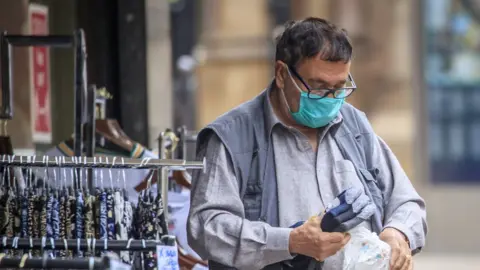Coronavirus: Report on BAME Covid-19 deaths sparks call for action
 PA Media
PA MediaDoctors have called for the recommendations of a report into the impact of Covid-19 on black, Asian and minority ethnic people to be implemented immediately.
The British Medical Association said it was "critical" to carry out risk assessments of vulnerable groups and protect them at work.
Racism could contribute to increased risks for BAME groups, the report said.
Commissioned by Public Health England, it has seven recommendations.
Dr Chaand Nagpaul, who chairs the council of the British Medical Association, told the BBC: "It's important we now move forward and deliver those changes because it's the fair and right thing to do for our population."
He said more than 90% of doctors who had died during the pandemic were from BAME backgrounds. Doctors from these communities were also three times as likely to say they had felt pressured to work without sufficient protective equipment, he added.
Dr Nagpaul said the recommendation for risk assessments would mean workers at the greatest risk - in healthcare and other key worker roles - could be redeployed into safer roles, such as tackling the backlog of non-coronavirus illness in the NHS.
The daughter of care home worker Joyce Davis, who continued working until she died with coronavirus aged 79, has told the BBC she feels let down.
Denise Davis said: "She was in the frontline, there was no protocols in place for them, for the people working in the home and she did feel exposed.
"We know that these are the lower end of the scale, lower paid, lower everything and these are where you'll find most black and ethnic minority people - why is that?"
The report, the second by PHE on Covid-19 inequalities and previously seen by the BBC in draft, said "historic racism and poorer experiences of healthcare or at work" meant black and Asian people were less likely to seek care when they needed or speak up if they had concerns about risk in the workplace.
Some people from ethnic minority communities feared being deported if they went to hospital for treatment, the report said.
It was prompted by data showing that black and Asian groups had the highest death rates from coronavirus. People of Bangladeshi ethnicity had twice the risk of death than people of white British ethnicity, accounting for age and sex.
The report said the unequal impact may be explained by social and economic inequalities, racism, discrimination and stigma, differing risks at work and inequalities in the prevalence of conditions such as obesity, diabetes, hypertension and asthma, which can increase the severity of Covid-19.
The report recommends:
- Better data collection about ethnicity and religion, including having this recorded on death certificates to accurately monitor the impact on these communities
- Supporting further research with the participation of ethnic minority communities to understand the increased risk and develop programmes to reduce it
- Improving BAME groups' access to, experiences of and outcomes from NHS and other services - using audits, health impact assessments and better representation of black and minority ethnic communities among staff
- Developing risk assessments for black, Asian and minority ethnic workers in roles where they are exposed to a large section of the general public or those infected with the virus
- Producing culturally sensitive education and prevention campaigns to rebuild trust and help communities access services such as contact tracing, antibody testing and a future vaccine
- Targeting ethnic minority groups with culturally sensitive health messages to address conditions such as diabetes, high blood pressure and asthma
- Ensuring that Covid-19 recovery strategies actively address inequalities to create long-term change
The existence of this second report was revealed by Prof Raj Bhopal from Edinburgh University, following criticism that an earlier review contained no recommendations. Prof Bhopal said it had initially been "suppressed".
He told BBC Radio 4's The World At One programme that the recommendations were "absolutely excellent" and could make England "probably the world leader" in addressing Covid-19 inequalities.

- SYMPTOMS: What are they and how to guard against them?
- GLOBAL SPREAD: Tracking the pandemic
- EUROPE LOCKDOWN: How is it being lifted?
- THE R NUMBER: What it means and why it matters
- STRESS: How to look after your mental health

Prof Bhopal said it was particularly important to provide public health information in languages other than English and called for the daily Downing Street briefing to to be translated.
"Currently the messages are going out for a largely white middle-class British population," he added.
Sir Michael Marmot, an expert health inequalities from University College London, said much of the increased risk to black and Asian people was caused by social and economic deprivation.
"It's systematic. It's related to to overcrowding, it's related to occupation, and those in turn are related to life chances," Sir Michael said.
He said black, Asian and minority ethnic groups were more likely to have lost their jobs in the pandemic or to be working in public-facing roles where they were exposed to the virus. "One way of describing that is racism," he said.

How has being black, Asian or from another ethnic minority impacted on your experience of the pandemic? Please tell us by emailing [email protected] - you can choose to be anonymous if you wish.
Please include a contact number if you are willing to speak to a BBC journalist.
- WhatsApp: +44 7756 165803
- Tweet: @BBC_HaveYourSay
- Please read our terms & conditions and privacy policy
